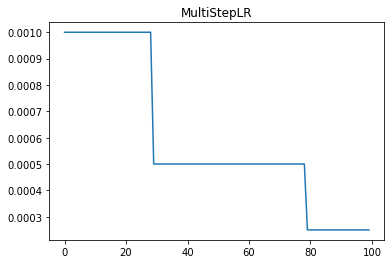lr_scheduler.MultiStepLR¶
- class lucid.optim.lr_scheduler.MultiStepLR(optimizer: Optimizer, milestones: list[int], gamma: float = 0.1, last_epoch: int = -1, verbose: bool = False)¶
The MultiStepLR learning rate scheduler reduces the learning rate by a fixed factor (gamma) at specified milestone epochs. This is useful for cases where learning rate changes are required at specific training progress points.
Class Signature¶
class MultiStepLR(
optimizer: Optimizer,
milestones: list[int],
gamma: float = 0.1,
last_epoch: int = -1,
verbose: bool = False
)
Parameters¶
optimizer (Optimizer): The optimizer whose learning rate needs to be scheduled.
milestones (list[int]): List of epoch indices where the learning rate should be reduced.
gamma (float, optional): The factor by which the learning rate is multiplied at each milestone. Default: 0.1.
last_epoch (int, optional): The index of the last epoch when resuming training. Default: -1.
verbose (bool, optional): If True, logs learning rate updates at each step. Default: False.
Mathematical Formula¶
The learning rate at epoch \(t\) is computed as:
Where: - \(\eta_t\) is the learning rate at epoch \(t\). - \(\eta_0\) is the initial learning rate. - \(\gamma\) is the decay factor. - The summation counts the number of milestones reached by epoch \(t\).

Methods¶
get_lr() -> list[float]: Computes the updated learning rate(s) based on milestone steps.
step(epoch: Optional[int] = None) -> None: Updates the learning rate based on the current epoch.
Usage Example¶
import lucid.optim as optim
from lucid.optim.lr_scheduler import MultiStepLR
optimizer = optim.SGD(model.parameters(), lr=0.1)
scheduler = MultiStepLR(optimizer, milestones=[10, 20, 30], gamma=0.5)
for epoch in range(40):
optimizer.step()
scheduler.step()
print(f"Epoch {epoch+1}, Learning Rate: {scheduler.last_lr}")
Note
MultiStepLR is useful when learning rate adjustments are needed at specific training milestones rather than at regular intervals.